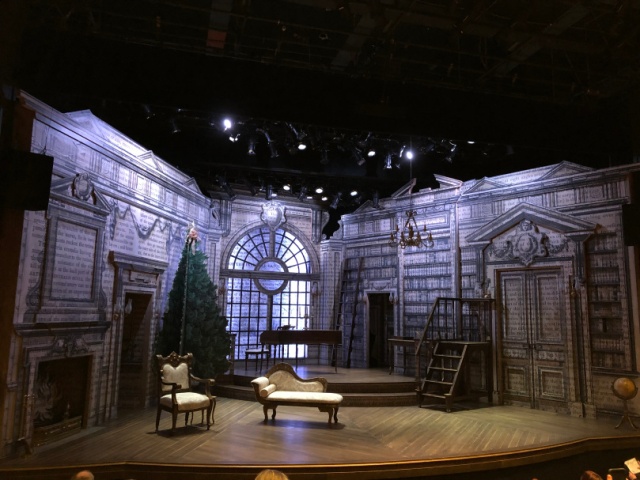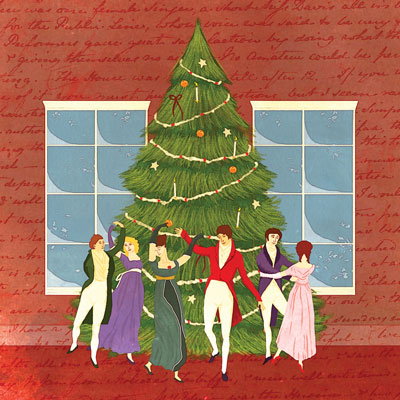Submitted by Anonymous on
Pictured: Victoria Grace, Katie Grindeland, Amanda Collins, and Alexis Bronkovic. Photo by Meghan Moore.
On November 30, 2018, I had the opportunity to see a preview of the Merrimack Repertory Theatre’s new show, Miss Bennet: Christmas at Pemberley, a spin-off/sequel to Jane Austen’s timeless classic, Pride and Prejudice. The play was written by Lauren Gunderson and Margot Melcon, directed by Sean Daniels, and assistant directed by Bridget Kathleen O’Leary.

The play as a whole was incredible; watching it was a fantastic way to transition into the Christmas season. The set, designed by James J. Fenton, was beautiful and the actors were well-casted and charming. Elizabeth Darcy (Alexis Bronkovic) and Anne de Bourgh (Veronika Duerr) were highlights for me personally, but I especially loved every scene that involved the sisters – Elizabeth, Jane, Mary, and Lydia (Kitty was in London, and did not join her sisters during the story). The four actors had incredible chemistry with each other, to the point where you could almost believe they were truly sisters in real life.
Pemberley is certainly more light-hearted and comic than Pride and Prejudice (though the novel itself had its humorous moments). But the play is at its best when it allows Mary Bennet – the forgotten middle sister – to seriously reflect on herself and on those around her. Having a scene between Mary and Darcy – both intelligent people who are not at ease with the social graces of their time – was a very good idea. Mary is open with Darcy, who in return understands and appreciates her, and recognizes her similarities to Lizzy. My favorite exchange was this:
MARY: I don’t mean to sound petulant, but neither [Lizzy] nor Jane have any conception of the invisibility I often feel around them. Around everyone.
DARCY: My understanding was always of yours and your sisters’ great love for each other.
MARY: Oh, indeed. But you see I grew up with the kindest, cleverest, and most beautiful elder sisters in the country; and with the loudest, silliest, and prettiest younger sisters in the country. This left few fair adjectives for me. I find I still suffer from lack of definition.
DARCY: Might you not define yourself, Miss Bennet?
MARY: That seems easier to articulate than to accomplish.
(p. 19)
I read Pride and Prejudice in 7th or 8th grade, and I always found myself sympathizing with the plain, serious Mary. Jane Austen presents the character in a rather unappealing light: the middle Bennet sister moralizes at others, tries to show off, and thinks that reading books makes her smarter and more authoritative than anyone else, though she rarely actually understands what she reads. If I met her in person, I would probably find her thoroughly insufferable. But she is still quite sympathetic: she wishes to make herself seen by her family, but cannot quite figure out how. Here is one of the first mentions of Mary in the novel:
“Mary wished to say something very sensible, but knew not how.”
(Pride and Prejudice, Chapter 2)
Quite relatable. I myself find that my wittiest responses come to mind almost two hours after the conversation is over.
Additionally, the two older sisters, Elizabeth and Jane, are the best of friends, while the two youngest, Kitty and Lydia are very close as well; Mary is quite left out, a sentiment to which many readers can relate.
The Mary of Pemberley has grown and matured from who she was in Jane Austen’s imagination. The characters within the play – Lizzy, Jane, Darcy – all comment on her changed behavior.
LIZZY: Do you know, Jane, a thought has lingered with me since your arrival: I like Mary. Is it terrible to admit that I didn’t know I did?
JANE: I feel ashamed of myself but…neither did I. She is changed, is she not?
LIZZY: Yes, for the better I think. She is remarkably observant; I’d never realized how much she sees. What she said yesterday about feeling…uncomfortable with her arrangement. It actually reminded me of…myself.
(p. 34)
The play makes Mary a much more likable person; she acknowledges her love for her sisters instead of looking down at them, she is more self-aware, and she is willing to apologize to and forgive Lydia despite her sister’s flightiness.
Additionally, Mary has a heightened awareness of her place in the world, suggested to be a result of being the only sister left at home with her parents. This awareness shifts into a longing to have a choice about how she could live her life. Another of my favorite scenes is when Mary rebukes Arthur de Bourgh (her love interest) for viewing his wealth and position as an impediment to his freedom, when in reality he could be putting his money and power to good use.
MARY. Well what are you waiting for? (Realizing she’s spoken out of turn.) I don’t mean to offend but…you seem to me to have a vast opportunity at your very fingertips. You, sir, can do anything you want. And you must see how devastating it is for someone like me to hear what you say. I long for the world and here you can have it! Some are not so fortunate to have a choice at all; how dare you not employ the choice you have?
(pp. 32-33)
Mary’s newfound wisdom is reminiscent of Elizabeth’s bold character in Pride and Prejudice. While in the novel, Elizabeth did not really fight against conforming to her role as a woman, she still spoke her mind and did not flinch from criticizing men for their improper behavior. Pemberley’s Mary still moralizes, but there is wisdom to her words rather than just hypocritical pontificating.
For the most part, I thought the play was a charming interpretation of what happened to Mary after the events of Pride and Prejudice. Mary grows to be more humble and accepting of her sisters, and they learn to accept her for who she is in return. I would have loved to see the play center entirely on Mary’s relationship with her family (including Kitty and the parents), even if the romantic storyline was not included. Nevertheless, this story will please anyone who ever sympathized with Mary. The Merrimack Repertory Theatre did justice to the Bennet sisters’ legacy, putting on a performance filled with love and joy. I couldn’t recommend it enough.
–Kripa Joseph, Cohort

Miss Bennet: Christmas at Pemberley runs November 28 – December 23
